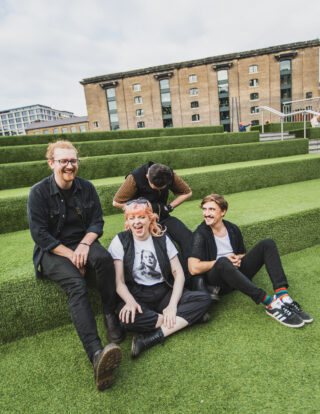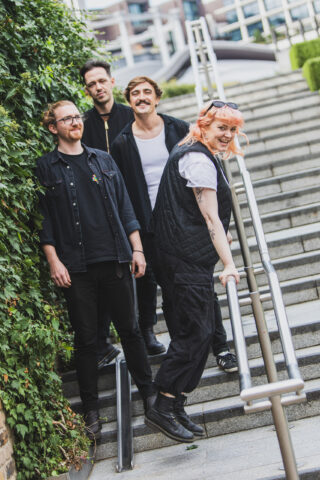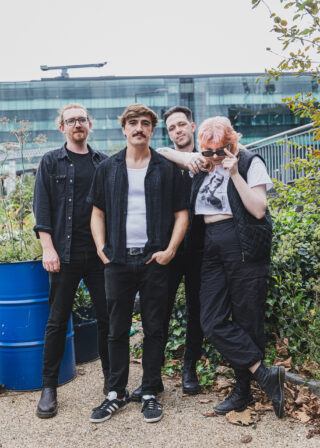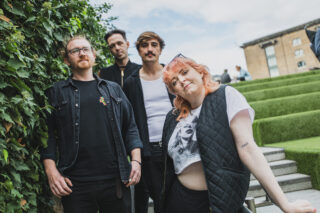Sprints: “We decided not to take the easy route, and to just go into the heavy stuff”
How the Dublin group decided to become a punk band and their own form of therapy

How the Dublin group decided to become a punk band and their own form of therapy
“Let’s take things up a notch,” roared Karla Chubb, lead vocalist and guitarist of Irish punk band Sprints to a sold-out London Scala last month. The band had been on stage for about 45 minutes, and their fans, by this point beaming and sweaty, had not stopped moving for most of that time. As Sprints launched into new single ‘Up and Comer’ the place erupted with bouncy, chaotic energy, buzzing with joyful catharsis. “I don’t know what that energy was,” Chubb tells me a week later, smiling incredulously. “I think we’ve got such a good relationship with each other; we’ve played so much by now that we just know exactly what we want to do – it felt so secure in that show that it was like, no matter what you did, you thought it was gonna go well.”
Right now feels like a pivotal moment for Sprints, whose debut album Letter To Self will be releases in January. Having garnered a devoted fan base with just two EPs (2021’s Manifesto and 2022’s A Modern Job), 2024 sees the band ramp up their live schedule, with EU, UK, Irish and US tours in quick succession. “Now more than ever, we’re such a live band,” Chubb says. “That’s where we thrive.” It’s unsurprising, given the band was born at a gig. “We always say that the inception moment was when me, Jack [Callan, drummer] and Colm [O’Reilly, guitarist] saw Savages at Electric Picnic [Dublin] in 2016, and we were like, ‘God, this is the music we love – why isn’t this the music we’re writing?’”
At that point, Chubb had been playing with Callan and O’Reilly for a few years, having been in bands together since school, but they had yet to land on a sound that clicked. “The issue was that we all have such diverse music taste that we could lean in any direction if we wanted to. Jack and I share a big Motown passion, and we’re also massively into folk; the Cat Stevens and Joni Mitchells of the world, as well as the indie sleaze in the early 2000s that shaped our youth. But the one that we kept coming back to was that early ’90s kind of grunge noise: the Pixies, PJ Harvey, Sonic Youth.”


Initially, Chubb admits, they were playing music that “maybe felt a little bit more approachable.” The Savages show set them on a new course. “We decided not to take the easy route,” she says, “and to just go into the heavy stuff. We got together with the purpose of writing really authentically and aggressively. And then we brought Sam [McCann, bassist] on board and it just felt really natural.”
Although Chubb is the lyricist, the rest of the band have been involved in the writing process since early on. “The way we work is very collaborative,” she tells me. “Pretty much from the inception of any song it gets shared with the guys and then we kind of rehearse them. We love to play live together. I think they don’t really form as songs until we rehearse them in a room.”
They’ve been prolific from the off. “We just kind of started writing and didn’t stop, and then the pandemic came and we wrote more and then we had two EPs under our belt before we knew it,” Chubb says with a laughs, “and now I feel like we blinked and there’s an album coming.” Dan Fox of fellow Dublin punk outfit Gilla Band produced both EPs, as well as Letter To Self, which they recorded over two weeks in the Loire Valley earlier in 2022. “Gilla Band were a massive influence on pretty much anyone in music and Dublin at that point,” Chubb notes. “You go to a Gilla Band show and you quite literally get battered around and come out dripping in sweat. You feel like this really cathartic release; I think that’s exactly what we wanted to capture.”
Sprints and Gilla Band are part of a wider cultural moment in Irish music right now – one which has seen young Irish artists across genres garnering huge, global acclaim. Fellow Dubliners Fontaines DC have been called the new kings of rock by more than a few, while Lankum’s latest record False Lankum has been considered folk music’s OK Computer, shortlisted for the Mercury Prize. CMAT, Kojaque and Just Mustard sell out venues all over the world.

“I would probably put it down to the socio-economic climate here,” posits Chubb. “Music, particularly punk music, has always been born out of aggression and frustration, and rising against the powers that be. I think there’s been a very, very difficult few years in Ireland, despite there being such positive cultural and social change at the same time, like with the abortion referendum [Sprints’ 2020 single ‘Manifesto’ was a call for equality, written during the referendum] and the marriage equality referendum. There’s been a lot of progress made, but we’ve also had a party in power for 12 or 13 years now that have progressively prioritised big money and venture funds and corporations over the greater good of the youth and the people here.” To that end, Sprints are in the minority as a group who have managed to remain in Dublin, with Chubb noting: “There’s been such a mass amount of emigration – out of groups of 20, 30 friends, I’ve got maybe two left in the city because it’s just so unlivable in terms of the cost.”
She points to music as a “positive outlet” for these frustrations. “When you can’t afford therapy every week because it’s so expensive, and we’re all living paycheck to paycheck and paying outrageous prices just to survive, then music and the arts have become that catharsis and a way to process emotions in a hopefully, healthy way.” Sprints’ own music often does just this. Letters To Self sees Chubb confronting past trauma and struggles with mental health, and at one point, on the sparse, heart-wrenching ‘Shadow of a Doubt’, suicidal thoughts. Given how fearless and upbeat her stage presence is, I wonder if she feels daunted by the prospect of performing these incredibly vulnerable songs to hundreds of people every night. “I’m probably more nervous for people to hear it on record than I am live to be honest,” she admits, “because I have no control over that anymore. And whatever performance I gave that day in the studio is cemented on record forever for the rest of my life, which is a little bit terrifying. Whereas live, it could change any day, any moment, any city. We can have total control of how that song is perceived and performed, which gives you a lot of power. It’s also up to me to reveal as little or as much as I want to onstage about the songs, whereas the record is so open for interpretation. I think that’s probably the scarier part for me.”

Recording in the isolated setting of Studio Black Box, in rural northern France, allowed the band to reckon with the emotional intensity of the record. “It’s the best way we could have done the album,” notes Chubb, “because it completely shut you off from the outside world. We were so detached from our personal lives the only thing that we focused on was the music and we were literally eating, breathing, sleeping the album. The impact of what we were writing, and the reality of that having to go out into the world became very real. So it allowed me personally to process and anticipate that. I think it’s always very daunting to put your personal and innermost insecurities on paper. And this is the first time there’s an album of those songs as opposed to just three or four.”
But if Letter To Self is thematically heavy, it is also profoundly optimistic, full of that joyful catharsis that made the Scala show so special, and no doubt many of those planned for next year. It’s an overwhelming schedule, but they’re prepared. “We’ve matured a lot in our approach to touring. Our first tour was absolute insanity – we came out of Covid not having played two shows, and I don’t think I had a voice by day four because we were falling into every pitfall; drinking and staying out late and sleeping terribly and eating shite. We’ve changed our approach a lot – now it’s all about prioritising the show. We’ve learnt the lessons, we’ve put the graft in, so now it’s just about hitting the ground running.”